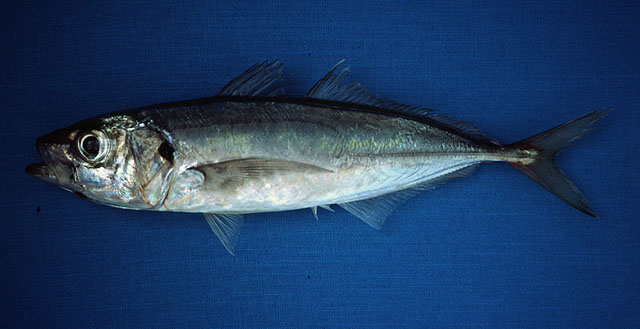| Carangidae (Jacks and pompanos), subfamily: Caranginae |
| 70 cm TL (male/unsexed); max. reported age: 16 years |
|
pelagic-oceanic; marine; depth range 10 - 306 m, oceanodromous |
| South Pacific and Southwestern Atlantic: Eastern Central and South Pacific: off Peru and Chile (Ref. 27363), incl. incidental in Juan Fernández Is. (Ref. 89357). Reported from off Ecuador (Ref. 9283). Southwest Pacific: off New Zealand (Ref. 5755). Southwestern Atlantic: off southern Argentina (Ref. 27363) |
|
Dorsal spines (total): 9-9; Dorsal soft rays (total): 31-35; Anal spines: 3-3; Anal soft rays: 27-29. Body elongated and little compressed; teeth small and uniseriate; lower branch of first gill arch with 42 to 45 gill rakers; edge of shoulders girdle (cleithrum) with a small furrow at its upper end but lacking papillae; lateral line completely scaled, the scales becoming large scutes posteriorly; scutes in the area of the median curve 1.1 to 1.6 times the diameter of the eye; nape and back metallic blue or dark gray; flanks and belly pale; dorsal edge of operculum with a black stain (Ref. 55763). Body elongate and slightly compressed. Body dark blue dorsally, silvery-white ventrally. Black spot on upper posterior margin of opercle. Fins dusky (Ref. 37339). Pectoral fin falcate and very long (Ref. 27363). |
| Adults are found in the shore and open oceanic waters, in schools. They feed mainly on fish larvae and small crustaceans. Marketed fresh (Ref. 9283). Utilized canned for human consumption and also made into fishmeal (Ref. 9988). The species is often found in Juan Fernández Is. as an incidental catch of Pseudocaranx chilensis (Guichenot, 1848) fisheries (Ref. 89357). |
|
Data deficient (DD); Date assessed: 30 April 2008 Ref. (130435)
|
| harmless |
Source and more info: www.fishbase.org. For personal, classroom, and other internal use only. Not for publication.

